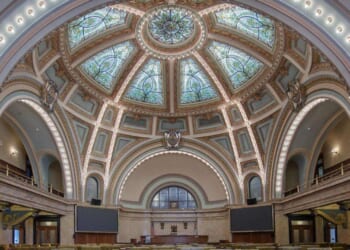Our liberties should not be compromised because of dysfunction in the political system
More than 40 Labour MPs have called for the introduction of digital ID, ostensibly so the government can “get a grip on illegal migration” and tackle benefits fraud.
But rather than succumbing to the call of yet more state control by caving in to long-resisted demands for a state identity programme, it’s a reminder that we should instead focus on answering what ought to be a fairly simple question — how many people actually live in the United Kingdom? Demanding to know how many people actually live in the realm is not an expressly anti-immigration stance — the salient point about the Findus ready meal scandal was not that people preferred beef to horse meat in their lasagna, but that Findus apparently had no idea what meat was in their lasagna, where it came from, or who put it there. Instead, much like ID cards, asking who is in our society is a question that strikes directly at our fundamental relationship with the state.
There is a pervasive view that many of the aspects of British society that were enjoyed in the past are simply not up to the task of dealing with a UK in 2025 — that traditional liberties were something that were compatible only within a homogenous, high trust community. They are simply a luxury that we can no longer afford in an era of enormous immigration from very different cultures, and it would be better to lock things down until we can deal with the problem. But this is a self-sabotaging view and only opens the door to the more extensive erosion of privacy with a promise of safety which is seldom if ever delivered upon.
We should bear in mind the famous case of Willcock v. Muckle. Compulsory identity cards had been re-introduced in World War II under the National Registration Act 1939. Governments granted greater powers seldom relinquish them, so after the war, despite a state of emergency no longer existing, the Attlee government chose to continue with ID cards. On 7 December 1950, Harry Willcock (an avowed hero of tech data giant Facebook and then Meta’s former vice president Nick Clegg) was stopped for speeding on Ballard’s Lane, North Finchley, London. Police Constable Harold Muckle asked him to produce his ID card. Willcock refused, saying “I am a Liberal, and I am against this sort of thing”. Willcock was as a result prosecuted under the 1939 Act.
Willcock took his case to the high court. The case was upheld, but the Lord Chief Justice Goddard then directed magistrates to give an absolute discharge to anyone refusing to show an ID card. He said: “To demand production of the card from all and sundry (…) is wholly unreasonable. To use Acts of Parliament passed for particular purposes in wartime when the war is a thing of the past tends to turn law-abiding subjects into lawbreakers, which is a most undesirable state of affairs”. As a result of Willcock’s persistence, he was the last to be prosecuted under the Act. When he died suddenly while debating at a meeting of the Eighty Club at the Reform Club, the final word on his lips before his death was reported to have been “freedom” (and I choose to believe this to be true). But we should not have to rely on a Harry Willcock, nor should we count on being able to raise one when powers granted to the state in a time of emergency are not readily relinquished.
It helps the cause of those Labour MPs that one of the perverse things about the push to introduce this scheme is that, the more the state expands into everyone’s lives, the more appealing ID cards have become as an apparent patch for the state’s shortcomings.
The answer to a failure of the state is not to reward the state with greater powers
A creaking state health service struggling to ration access to healthcare? We should introduce ID cards. A police force failing to protect citizens from violence and fraud? We should introduce ID cards. A state unable to control its borders at a basic level? We should introduce ID cards. A state that has already expanded into monitoring of speech and data to such a degree that one more document won’t make any difference? We should introduce ID cards.
Well, how about no? The answer to a failure of the state is not to reward the state with greater powers. We should instead demand accountability, and that should begin with a serious-minded effort to establish how many people are living in our society.
As far as conspiracy theories go, the idea that the UK’s population is far higher than officially stated is incredibly plausible. If you were to look around at the everyday travails that come with life in Britain — whether it’s queuing at 8am with 30 other people to see a doctor, stories of thousands of pounds with of taxi journeys to ferry children to the nearest school with an available place, or ever more ridiculous examples of a degradation in housing quality — and then you were told that, actually, there are 5-10 million more people in the country than previously estimated, it would make a lot of sense. Britain with a comparable GDP per capita to Canada or Germany just feels … off.
The theory is supported by plenty of anecdotal information, though some of it hard to verify, including supermarket and agricultural insiders suggesting that consumption patterns indicate a population of 77-80 million. There are also plenty of anecdotes that sewage and utility companies are operating on a shadow population number far higher than official statistics.
Outside those anecdotal stats, there are also far more concrete examples of huge underestimations of the demographics of the United Kingdom (apologies in advance for all the anecdotes). To start with, the estimates of the numbers of EU nationals living in the UK at the time of the country’s withdrawal from the European Union. Before the Brexit withdrawal, estimates of EU citizens living in the UK varied, but generally hovered around 3.5—3.7 million. The Office for National Statistics (ONS) applied a figure of approximately 3.5 million (excluding Irish citizens, exempt from a need to apply for settled status) based on the Annual Population Survey (APS) for mid-2020. Other pre-referendum estimates used a figure of 3 million, including the pressure group “the3million”. In contrast, the EU Settlement Scheme (EUSS) received approximately 5.76 million unique applications for settled status in the UK. (Granted, there is an ONS blogpost that attempts to explain away this discrepancy, but it’s hard to read it and be flooded with confidence.)
Another major source of distrust in UK immigration and population data is the part played by the International Passenger Survey (IPS) and its major role in Long-Term International Migration (LTIM) estimates. Conducted by the ONS since 1961, the survey relies on IPS staff conducting face-to-face interviews with passengers at major UK ports (19 airports, eight sea routes, Eurostar, Eurotunnel) for 362 days a year. Surveying arrivals at random, they ask about travel purpose, intended length of stay, nationality, occupation, and spending. For migration, it captures self-reported intentions to stay for more than 12 months. All in, it conducts 700,000-800,000 interviews a year, of which 250,000 or so are selected for modelling (e.g., 285,000 in 2022), from which the ONS derives an estimate of immigration to the UK. This sounds thorough enough on the face of it, but in reality it couldn’t be more of a relic from a Pathé reel of bowler-hatted travellers. It relies on an incredibly small sample size (~0.15 percent) leading to very wide confidence intervals, especially when broken down to nationality or intent. This would not necessarily be a disaster when immigration is running at a couple of thousands a year, but it is extremely important when net immigration is close to breaking a million annually. It is also extremely reliant on honesty when the nice person from the IPS asks a traveller how long they intend to stay in Britain. Overall, this is a system that is totally lax either by design or by neglect.
In the aftermath of COVID restrictions that caused the system to be suspended for a period, there have been some attempts to beef up the data using sources such as interactions with tax, benefits, and National Insurance number registrations. But again, this is reliant on honest and law-abiding conduct by those being measured.
From an infrastructure perspective, an extra 100,000 people is a requirement for roughly an extra two hospitals, six secondary schools, and thirty or so primary schools. In a functioning market, this demand may have been mopped up by the private sector. But Britain does not have a functioning market — it has an enormous state healthcare system and an open hostility to the private provision of education, and the socialist calculation problem is a hard enough conundrum for central planners without not even knowing how many they’re planning for.
Politically, it matters for public tolerance of a great many things if we are in fact worse off on a per-person basis than we thought. If despite the enormous taxes being paid by individuals, inadequate infrastructure has not been built, why are these taxes being tolerated? If the huge social upheaval of the arrival of millions of people to Britain has not caused individual prosperity for all, but rather it had been yet another attempt to resolve the issues of socialism by expanding the size of the commune, then we should be in full possession of the fact.
It is not just practical, but moral to know how many people we live with
Rejecting ID cards but then appealing for the state to do a headcount of those living in the nation is not rejecting one form of statism for another, but demanding responsibilities from consensual government. It is not just practical, but moral to know how many people we live with. “If man in the state of nature be so free, as has been said; if he be absolute lord of his own person and possessions, equal to the greatest, and subject to nobody, why will he part with his freedom? Why will he give up this empire, and subject himself to the dominion and control of any other power?” To which it is obvious to answer, says John Locke, in his Second Treatise. Men will consensually enter into a state of society to protect himself from uncertainty and invasion of others and so “he seeks out, and is willing to join in society with others, who are already united, or have a mind to unite, for the mutual preservation of their lives, liberties and estates, which I call by the general name, property.”
It is extremely reasonable to ask with whom one is in society when resigning power into the hands of its rulers, but we can and should achieve this without yet another surrender to the surveillance state. Identity cards and the further erosion of the civil liberties of all should not be a price paid for a state unable or unwilling to live up to one of its most basic moral obligations.







